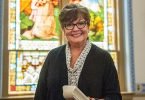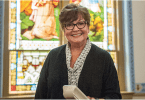by Lesle Knop
I’ve been thinking about multiculturalism lately. I’m taking a graduate course in multicultural education at a nearby university this semester. My professor is bright, considerate of her students’ varied experiences, and organized, which makes for time well spent.
As in any class, the reading and writing assignments are beneficial, but the true learning comes during class discussions when cartoon “light bulbs” visibly blink above the students’ heads.
Class discussions about English as the “official language” in the United States, about the various theoretical approaches to effective education of diverse cultures in a community — about gender, race, ethnicity and all the ways we tend to separate ourselves from one another — make some brains (mine) work harder.
I can’t help but think about the “catholicity” of our church and the beauty of the many faces that share our faith. Or marvel at the many languages that speak the same prayers, sing the same psalms. I am in awe of God’s plan for our salvation.
The class has helped me appreciate even more the extent to which the church influenced the shaping of America’s ideals. As a melting pot, the nation wasn’t always magnanimous toward immigrant populations. In centuries past, our beautiful mother, the church, was largely responsible for educating many groups of poor, non-English-speaking immigrants that America’s established, mostly Protestant, society shunned. Life-giving grace bestowed by charity and love built the communities that became America.
How does this impact my understanding of stewardship? Social justice issues that cause emotions and voices to rise in the body politic should unite us as Catholics. As much now as ever in our nation’s history, the education of our children in our faith, care for the elderly and infirm, access to human services by those in need, the preservation of religious and economic freedoms — these issues matter.
In class this semester, I am learning to open my eyes and my heat and see the world from others’ perspectives. The manner by which we stereotype members of groups creates barriers to faith and understanding.
From a social justice perspective, as taught by the Catholic Church, what should be my disciple’s response? Christian stewards recognize the responsibility to give back at every opportunity with increase to the Lord.
In holy Scripture, Jesus teaches us to care for one another. When it comes to multicultural education, his teaching is still the best. What’s more, enrollment is always open and free.



